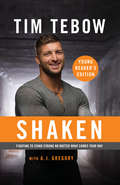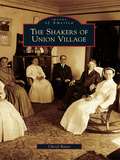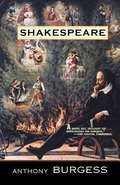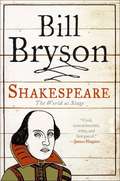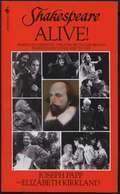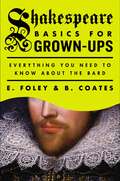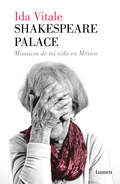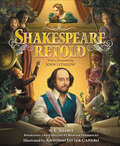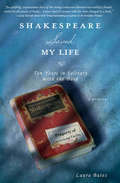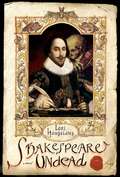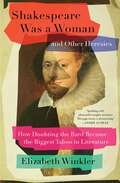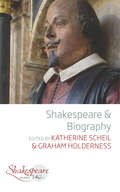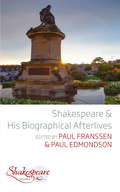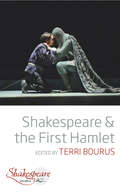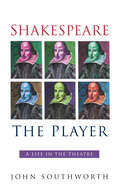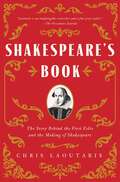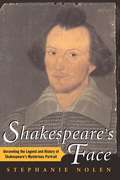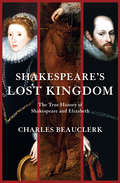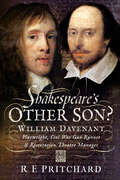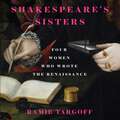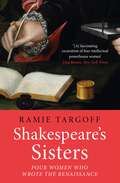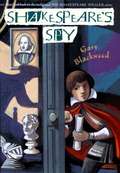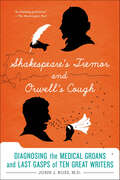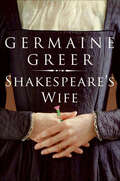- Table View
- List View
Shaken: Fighting to Stand Strong No Matter What Comes Your Way
by Tim TebowYour identity is defined--not by changing circumstances-- but an unchanging God!Whether you’re celebrating an incredible victory or facing life’s biggest disappointment, your response will reveal who you really are.In this powerful book designed specifically for young Christians, Heisman Trophy winner Tim Tebow provides an intimate look into how he’s been able to face professional triumphs and defeats and still emerge with his faith and identity intact. In Shaken: The Young Reader’s Edition, Tebow shares his insight for shaping an identity based not on your highs and lows, but on God. He examines the courageous lives of Biblical figures and the many inspirational people he’s met to show you how to: Overcome your fears and accept God’s perfect, unconditional loveTransform your insecurities into opportunities for growthEmbrace your unique, God-given talents to make a difference in your world With honesty that speaks directly to the heart, Tebow will inspire you to build a God-centered identity and begin today to live out your divine purpose!
Shakers of Union Village, The
by Cheryl BauerFounded in 1805, Union Village began as a religious and communal experiment. Eventually it became one of America's largest and most productive Shaker communities, its members achieving many firsts in education, equality, music, horticulture, and animal husbandry. Their unique faith influenced every aspect of their lives, from making furniture to raising children. They welcomed the leading figures of the period, including Native American chiefs, politicians, and abolitionists, while they continued to open other Shaker settlements in Ohio, Kentucky, Indiana, and Georgia. These vintage images--including many never published before--trace the Shakers' progress as they worked toward creating an earthly paradise. Although Union Village dissolved in 1912, some Shakers remained there for almost another decade. Today Union Village's heritage is still shared with the public at OtterbeinLebanon Retirement Community and in neighboring Lebanon.
Shakespeare
by Anthony BurgessLike Burgess's early novel, Nothing Like the Sun: A Story of Shakespeare's Love-Life, this equally delightful factual treatment of what we know of the Bard combines Burgess's stimulating erudition and his well-informed imagination. The result is at once a speculative biography, a theatrical history, and a re-creation of the Elizabethan age. Whether a vivid retracing of the evolution Elizabethan theater, a bravura reconstruction of the first performance of Hamlet, an infiltration of the intricacies of the court of the Virgin Queen, or an elegy on the era's end with the distrastrous Essex Rebellion, Burgess -- author of the classic A Clockwork Orange -- sets the stage for England's most glorious time and turns the spotlight on the figure of William Shakespeare. <p><p>"Animated by affection and an understanding of the creative imagination that only a creative writer can bring to bear."—Atlantic Monthly<p> "A smooth-flowing narrative, often enlivened by Anthony Burgess's Joycean appetite for linguistic fantasy."—Economist<p> "Bright, racy...knowledgeable and humorous, alternately sensible and quirky."—Terry Eagleton, Commonweal <p>"Burgess's wonderfully well-stocked mind and essentially wayward spirits are just right for summoning up an apparition of the Bard...."—Daily Telegraph
Shakespeare
by Bill BrysonWilliam Shakespeare, the most celebrated poet in the English language, left behind nearly a million words of text, but his biography has long been a thicket of wild supposition arranged around scant facts. With a steady hand and his trademark wit, Bill Bryson sorts through this colorful muddle to reveal the man himself. Bryson documents the efforts of earlier scholars, from today's most respected academics to eccentrics like Delia Bacon, an American who developed a firm but unsubstantiated conviction that her namesake, Francis Bacon, was the true author of Shakespeare's plays. Emulating the style of his famous travelogues, Bryson records episodes in his research, including a visit to a bunkerlike room in Washington, D.C., where the world's largest collection of First Folios is housed. Bryson celebrates Shakespeare as a writer of unimaginable talent and enormous inventiveness, a coiner of phrases ("vanish into thin air," "foregone conclusion," "one fell swoop") that even today have common currency. His Shakespeare is like no one else's-the beneficiary of Bryson's genial nature, his engaging skepticism, and a gift for storytelling unrivaled in our time.
Shakespeare Alive!
by Joseph Papp Elizabeth KirklandFrom Joseph Papp, American's foremost theater producer, and writer Elizabeth Kirkland: a captivating tour through the world of William Shakespeare. Discover the London of Shakespeare's time, a fascinating place to be--full of mayhem and magic, exploration and exploitation, courtiers and foreigners. Stroll through narrow, winding streets crowded with merchants and minstrels, hoist a pint in a rowdy alehouse, and hurry across the river to the open-air Globe Theater to see that latest play written by a young man named Will Shakespeare. Shakespeare Alive! spirits you back to the very years of that London--as everyday people might have experienced it. Find out how young people fell in love, how workers and artists made ends meet, what people found funny and what they feared most. Go on location with an Elizabethan theater company to learn how plays were produced, where Shakespeare's plots came from and how he transformed them. Hear the music of Shakespeare's language and words we still use today that were first spoken in his time. Open the book and elbow your way into the Globe with the groundlings. You'll be joining one of the most democratic audiences the theater has ever known--alewives, apprentices, shoemakers and nobles--in applauding the dazzling wordplay and swordplay brought to you by William Shakespeare.
Shakespeare Basics for Grown-Ups
by E. Foley B. CoatesAn essential guide to Shakespeare, from the international bestselling authors of Homework for Grown-Ups The Bard was so incredibly prolific that even most Shakespeare scholars would welcome the occasional refresher course, and most of the rest of us haven't even got a clue as to what a petard actually is. Fear not, the bestselling authors of Homework for Grown-Ups are here to help. For parents keen to help with their children's homework, casual theatre-goers who want to enhance their enjoyment and understanding, and the general reader who feels they should probably know more, Shakespeare Basics for Grown-Ups includes information on the key works, historical context, contemporaries and influences, famous speeches and quotations, modern day adaptations, and much, much more.
Shakespeare Palace: Mosaicos de su vida en México (1974-1984)
by Ida VitaleShakespeare Palace es un libro cálido, inolvidable, que rehace el México de finales de los setenta a mediados de los ochenta al cual la gran poeta Ida Vitale llegó para ser acogida. Ganadora del Premio Cervantes 2018. De Ida Vitale, ganadora del Premio Internacional de Poesía Federico García Lorca. Ida Vitale reconstruye, en mosaicos, la historia de diez años que pasó en la Ciudad de México: desde las calles empinadas de la colonia San Ángel hasta los sabores de la comida mexicana, o el encuentro con palabras tan sutiles e imborrables como "tlapalería". Ida Vitale llega a México debido a la diáspora uruguaya. Aquí encuentra un mundo que la acoge y nuevos significados que ella, y su marido, habrán de acomodar. Esen esta ciudad, en la calle de Shakespeare, donde encuentran a Elena, una vecina que convive entre intelectuales y artistas, y de la cual aprovechan la calidez. Su primer desembarco es en casa de Ulalume y Teodoro González de León. Será desde ese momento que comenzarán a conocer el mundo intelectual mexicano que los arraigará, de alguna manera, a este país. Ida trabaja todos los días en el Colegio de México, al lado de Tomás Segovia, con distintos proyectos de traducción. Conoce a Paz, habla de Elena Garro, se encuentra con Arreola y José de la Colina. Entabla cercana relación con Efraín Huerta y su familia, con Emmanuel Carballo y su mujer, entre muchos otros. Shakespeare Palace es un libro cálido, inolvidable, que rehace ese México de finales de los setenta a mediados de los ochenta.
Shakespeare Retold
by E. NesbitA beautifully illustrated collection of prose retellings of seven Shakespeare plays will bring the Bard to life for young readers. Not only is this a beautiful keepsake edition, full of gorgeous illustrations by Antonio Javier Caparo, but the prose retellings by beloved classic children’s book author E. Nesbit are an excellent tool to introduce children to the complex language of Shakespeare.A foreword by John Lithgow touches on his own childhood as a Shakespearean actor and the importance of Shakespeare. The book contains extensive support materials, including a biography, a timeline of Shakespeare’s life, and further recommended readings.In this volume, you will find:Romeo and JulietA Midsummer Night’s DreamTwelfth NightHamletMacbethThe TempestMuch Ado About Nothing
Shakespeare Saved My Life
by Laura Bates<P>While He Was Breaking Out of Prison, She Was Trying to Break In. <P>Shakespeare professor and prison volunteer Laura Bates thought she had seen it all. That is, until she decided to teach Shakespeare in a place the bard had never been before -- supermax solitary confinement. <P>In this unwelcoming place, surrounded by inmates known as the worst of the worst, is Larry Newton. A convicted murderer with several escape attempts under his belt and a brilliantly agile mind on his shoulders, Larry was trying to break out of prison at the same time Laura was fighting to get her program started behind bars. <P>Thus begins the most unlikely of friendships, one bonded by Shakespeare and lasting years--a friendship that, in the end, would save more than one life.
Shakespeare Undead
by Lori HandelandWilliam Shakespeare was one of history's greatest writers, a master of words with a body of work that is truly impressive. some may say a little too impressive for a single man to accomplish in one lifetime. Perhaps, as many have speculated, he had assistance. Or perhaps the explanation is more...unusual. Who was William Shakespeare? Who was the Dark Lady of the Sonnets? Why are the undead stalking the alleyways of London? And can they be stopped? Something is definitely rotten in the state of Denmark. So brace yourself for a wild ride through twisted streets and shadowed graveyards of Elizabethan London, where you'll discover how the Bard got his Bite.
Shakespeare Was a Woman and Other Heresies: How Doubting the Bard Became the Biggest Taboo in Literature
by Elizabeth WinklerAn &“extraordinarily brilliant&” and &“pleasurably naughty&” (André Aciman) investigation into the Shakespeare authorship question, exploring how doubting that William Shakespeare wrote his plays became an act of blasphemy…and who the Bard might really be.The theory that Shakespeare may not have written the works that bear his name is the most horrible, unspeakable subject in the history of English literature. Scholars admit that the Bard&’s biography is a &“black hole,&” yet to publicly question the identity of the god of English literature is unacceptable, even (some say) &“immoral.&” In Shakespeare Was a Woman and Other Heresies, journalist and literary critic Elizabeth Winkler sets out to probe the origins of this literary taboo. Whisking you from London to Stratford-Upon-Avon to Washington, DC, she pulls back the curtain to show how the forces of nationalism and empire, religion and mythmaking, gender and class have shaped our admiration for Shakespeare across the centuries. As she considers the writers and thinkers—from Walt Whitman to Sigmund Freud to Supreme Court justices—who have grappled with the riddle of the plays&’ origins, she explores who may perhaps have been hiding behind his name. A forgotten woman? A disgraced aristocrat? A government spy? Hovering over the mystery are Shakespeare&’s plays themselves, with their love for mistaken identities, disguises, and things never quite being what they seem. As she interviews scholars and skeptics, Winkler&’s interest turns to the larger problem of historical truth—and of how human imperfections (bias, blindness, subjectivity) shape our construction of the past. History is a story, and the story we find may depend on the story we&’re looking for. &“Lively&” (The Washington Post), &“fascinating&” (Amanda Foreman), and &“intrepid&” (Stacy Schiff), Shakespeare Was a Woman and Other Heresies will forever change how you think of Shakespeare…and of how we as a society decide what&’s up for debate and what&’s just nonsense, just heresy.
Shakespeare and Biography (Shakespeare & #8)
by Graham Holderness Katherine ScheilFrom Shakespeare’s religion to his wife to his competitors in the world of early modern theatre, biographers have approached the question of the Bard’s life from numerous angles. Shakespeare & Biography offers a fresh look at the biographical questions connected with the famous playwright’s life, through essays and reflections written by prominent international scholars and biographers.
Shakespeare and Company
by Sylvia BeachSylvia Beach was intimately acquainted with the expatriate and visiting writers of the "Lost Generation", a label that she never accepted. Like moths of great promise, they were drawn to her well-lighted bookstore and warm hearth on the Left Bank. Shakespeare and Company evokes the zeitgeist of an era through its revealing glimpses of James Joyce, Ernest Hemingway, Scott Fitzgerald, Sherwood Anderson, Andre Gide, Ezra Pound, Gertrude Stein, Alice B. Toklas, D. H. Lawrence, and others already famous or soon to be. In his introduction to this new edition, James Laughlin recalls his friendship with Sylvia Beach. Like her bookstore, his publishing house, New Directions, is considered a cultural touchstone.
Shakespeare and His Biographical Afterlives (Shakespeare & #6)
by Paul Franssen & Paul EdmondsonNew Shakespeare biographies are published every year, though very little new documentary evidence has come to light. Inevitably speculative, these biographies straddle the line between fact and fiction. Shakespeare and His Biographical Afterlives explores the relationship between fiction and non-fiction within Shakespeare’s biography, across a range of subjects including feminism, class politics, wartime propaganda, children’s fiction, and religion, expanding beyond the Anglophone world to include countries such as Germany and Spain, from the seventeenth century to present day.
Shakespeare and the First Hamlet (Shakespeare & #9)
by Terri BourusThe first edition of Hamlet – often called ‘Q1’, shorthand for ‘first quarto’ – was published in 1603, in what we might regard as the early modern equivalent of a cheap paperback. Yet this early version of Shakespeare’s classic tragedy is becoming increasingly canonical, not because there is universal agreement about what it is or what it means, but because more and more Shakespearians agree that it is worth arguing about. The essays in this collected volume explore the ways in which we might approach Q1’s Hamlet, from performance to book history, from Shakespeare’s relationships with his contemporaries to the shape of his whole career.
Shakespeare the Player: A Life in the Theatre
by John SouthworthTo his contemporaries, Shakespeare was known as an actor, not a playwright, yet this fact has been largely ignored. This title overturns traditional images of the Bard, arguing that Shakespeare cannot be separated from his profession as a player any more than he can be separated from his works.
Shakespeare's Book: The Story Behind the First Folio and the Making of Shakespeare
by Chris LaoutarisThe never-before-told story of how the makers of The First Folio created Shakespeare as we know him today. 2023 marks the 400-year anniversary of the publication of Mr William Shakespeare&’s Comedies, Histories, & Tragedies, known today simply as the First Folio. It is difficult to imagine a world without The Tempest, Twelfth Night, Antony and Cleopatra, The Winter&’s Tale, and Macbeth, but these are just some of the plays that were only preserved thanks to the astounding labor of love that was the first collected edition of Shakespeare&’s plays. When the First Folio hit the bookstalls in 1623, nearly eight years after the dramatist&’s death, it provided eighteen previously unpublished plays, and significantly revised versions of close to a dozen other dramatic works, many of which may not have survived without the efforts of those who backed, financed, curated, and crafted what is arguably one of the most important conservation projects in literary history. Without the First Folio Shakespeare is unlikely to have acquired the towering international stature he now enjoys across the arts, the pedagogical arena, and popular culture. Its lasting impact on English national heritage, as well as its circulation across cultures, languages, and media, makes the First Folio the world&’s most influential secular book. But who were the personalities behind the project and did Shakespeare himself play a role in its inception Shakespeare&’s Book: The Story Behind the First Folio and the Making of Shakespeare charts, for the first time, the manufacture of the First Folio against a turbulent backdrop of seismic political events and international tensions which intersected with the lives of its creators and which left their indelible marks on this ambitious publication-project. This story uncovers the friendships, bonds, social ties, and professional networks that facilitated the production of Shakespeare&’s book—as well as the personal challenges, tragedies and dangers that threw obstacles in the path of its chief backers. It reveals how Shakespeare himself, before his death, may have influenced the ways in which his own public identity would come to be enshrined in the First Folio, shaping his legacy to future generations and determining how the world would remember him: "not of an age, but for all time." Shakespeare&’s Book tells the true story of how the makers of the First Folio created &“Shakespeare&” as we know him today.
Shakespeare's Face: Unraveling the Legend and History of Shakespeare's Mysterious Portrait
by Stephanie NolenA fascinating literary detective story charting the surprising, true history of a recently discovered painting of Shakespeare held by the same family for 400 years -- adding new drama to the Bard's life.When author Stephanie Nolen reported the discovery of the only portrait of William Shakespeare painted while he was alive, the announcement ignited furious controversy around the world.Now, in this provocative biography of the portrait, she tells the riveting story of how a rare image of the young Bard at thirty-nine came to reside in the suburban home of a retired engineer, whose grandmother kept the family treasure under her bed, and how he embarked on authenticating it. The ultimate Antiques Roadshow dream, the portrait has been confirmed by six years of painstaking forensic studies to date from around 1600, and it has not been altered since.
Shakespeare's Lost Kingdom: The True History of Shakespeare and Elizabeth
by Charles Beauclerk“A book for anyone who loves Shakespeare . . . One of the most scandalous and potentially revolutionary theories about the authorship of these immortal works” (Mark Rylance, First Artistic Director of Shakespeare’s Globe Theatre). It is perhaps the greatest story never told: the truth behind the most enduring works of literature in the English language, perhaps in any language. Who was William Shakespeare? Critically acclaimed historian Charles Beauclerk has spent more than two decades researching the authorship question, and if the plays were discovered today, he argues, we would see them for what they are—shocking political works written by a court insider, someone with the monarch’s indulgence, shielded from repression in an unstable time of armada and reformation. But the author’s identity was quickly swept under the rug after his death. The official history—of an uneducated merchant writing in near obscurity, and of a virginal queen married to her country—dominated for centuries. Shakespeare’s Lost Kingdom delves deep into the conflicts and personalities of Elizabethan England, as well as the plays themselves, to tell the true story of the “Soul of the Age.” “Beauclerk’s learned, deep scholarship, compelling research, engaging style and convincing interpretation won me completely. He has made me view the whole Elizabethan world afresh. The plays glow with new life, exciting and real, infused with the soul of a man too long denied his inheritance.” —Sir Derek Jacobi
Shakespeare's Other Son?: William Davenant, Playwright, Civil War Gun Runner & Restoration Theatre Manager
by R.E. PritchardSir William Davenant (1606-1668) was in his time widely known as 'Davenant the Poet'. The son of an Oxford vintner (or quite possibly the natural son of his godfather, William Shakespeare), he wrote poems for and about the Court of Charles I, and, despite losing his nose to mercury treatment for the clap, which other people thought funny, went on to replace Ben Jonson as Poet Laureate and collaborate with Inigo Jones in composing spectacular Court masques, as well as writing many successful plays -- a few fashionably blood-thirsty, most showing a real comic gift, humanity and sympathy with 'ordinary life'. In the Civil War, he earned a knighthood as an especially successful gun-runner for the Royalists, before escaping to Paris, where he worked on an epic poem. Then sent off by Charles II to colonize Virginia but captured by the Parliamentarians, he escaped execution but was imprisoned for five years. With the Restoration, he practically re-invented English theatre, with the first English opera, women actors, movable scenery and the proscenium arch, as well as reviving interest in Shakespeare with inventive adaptations. Energetic, affable and resilient, he was an appealing and well-liked character. Celebrated and important in his day, Davenant is now surprisingly little known. This enterprising study introduces modern readers to his wit, poetry, and growing scepticism as to Court and aristocratic values, and his developing feminist sympathies. Here, select excerpts and summaries bring this entertaining writer to a new, wider audience.
Shakespeare's Sisters: Four Women Who Wrote the Renaissance
by Ramie Targoff'An outstanding revisionist portrait of an age' Telegraph'Targoff tells their stories with vim and vigour' i Paper'[A] fascinating excavation of four intellectual powerhouse women' Tina Brown, New York Times Discover the lives and work of four ambitious Renaissance women who, against all odds, made themselves heard-and read-in the time of ShakespeareIn an innovative and engaging narrative of everyday life in Shakespeare's England, Ramie Targoff carries us from the sumptuous coronation of Queen Elizabeth in the mid-16th century into the private lives of four women writers working at a time when women were legally the property of men. Some readers may have heard of Mary Sidney, accomplished poet and sister of the famous Sir Philip Sidney, but few will have heard of Aemilia Lanyer, the first woman in the 17th century to publish a book of original poetry, which offered a feminist take on the crucifixion, or Elizabeth Cary, who published the first original play by a woman, about the plight of the Jewish princess Mariam. Then there was Anne Clifford, a lifelong diarist, who fought for decades against a patriarchy that tried to rob her of her land in one of England's most infamous inheritance battles. These women had husbands and children to care for and little support for their art, yet against all odds they defined themselves as writers, finding rooms of their own where doors had been shut for centuries. Targoff flings them open to uncover the treasures left by these extraordinary women; in the process, she helps us see the Renaissance in a fresh light, creating a richer understanding of history and offering a much-needed female perspective on life in Shakespeare's day.
Shakespeare's Sisters: Four Women Who Wrote the Renaissance
by Ramie TargoffDiscover the lives and work of four ambitious Renaissancewomen who, against all odds, made themselves heard-and read-in the time of ShakespeareIn an innovative and engaging narrative of everyday life in Shakespeare's England, Ramie Targoff carries us from the sumptuous coronation of Queen Elizabeth in the mid-16th century into the private lives of four women writers working at a time when women were legally the property of men. Some readers may have heard of Mary Sidney, accomplished poet and sister of the famous Sir Philip Sidney, but few will have heard of Aemilia Lanyer, the first woman in the 17th century to publish a book of original poetry, which offered a feminist take on the crucifixion, or Elizabeth Cary, who published the first original play by a woman, about the plight of the Jewish princess Mariam. Then there was Anne Clifford, a lifelong diarist, who fought for decades against a patriarchy that tried to rob her of her land in one of England's most infamous inheritance battles. These women had husbands and children to care for and little support for their art, yet against all odds they defined themselves as writers, finding rooms of their own where doors had been shut for centuries. Targoff flings them open to uncover the treasures left by these extraordinary women; in the process, she helps us see the Renaissance in a fresh light, creating a richer understanding of history and offering a much-needed female perspective on life in Shakespeare's day.
Shakespeare's Spy
by Gary L. BlackwoodIntrigue, betrayal, and romance surround Widge as we find him back in London and at the center of things, as usual. Queen Elizabeth, Shakespeare's patron, has died, but the new king and his queen love drama--on stage and off.
Shakespeare's Tremor and Orwell's Cough: Diagnosing the Medical Groans and Last Gasps of Ten Great Writers
by John J. Ross“The stories of the wounded storytellers unfold smoothly on the page, as mesmerizing as any they themselves might have told.” —The New York TimesThe Bard meets House, M.D. in this fascinating untold story of the impact of disease on the lives and works of some the finest writers in the English language. John Ross cheerfully debunks old biographical myths and suggests fresh diagnoses for these writers' real-life medical mysteries.Were Shakespeare's shaky handwriting, his obsession with venereal disease, and his premature retirement connected? Did Jonathan Swift's preoccupation with sex and filth result from a neurological condition that might also explain his late-life surge in creativity? Was Jack London a suicide, or was his death the product of a series of self-induced medical misadventures? Why did W. B. Yeats's doctors dose him with toxic amounts of arsenic? Did writing Nineteen Eighty-Four actually kill George Orwell?With a healthy dose of gross descriptions—from a time when leeches were used for bleeding and cupping was a common method of cure, a time before vaccinations, sterilized scalpels, or real drug regimens—and a deep love for the literary output of these ten greats, Ross is the doctor these writers should have had in their time of need.“Engrossing . . . witty and deeply humane.” —The Wall Street Journal“Into a satisfying series of medical mysteries [Ross] injects notes of wry humor and obvious affection.” —The Boston Globe“A rollicking good story.” —The Washington Post“A fascinating, surprising, and at times hilarious compilation.” —New Scientist
Shakespeare's Wife
by Germaine GreerLittle is known about Ann Hathaway, the wife of England's greatest playwright; a great deal, none of it complimentary, has been assumed. The omission of her name from Shakespeare's will has been interpreted as evidence that she was nothing more than an unfortunate mistake from which Shakespeare did well to distance himself.While Shakespeare is above all the poet of marriage—repeatedly in his plays, constant wives redeem unjust and deluded husbands—scholars persist in positing the worst about the writer's own spouse. In Shakespeare's Wife, Germaine Greer boldly breaks new ground, combining literary-historical techniques with documentary evidence about life in Stratford, to reset the story of Shakespeare's marriage in its social context. With deep insight and intelligence, she offers daring and thoughtful new theories about the farmer's daughter who married England's greatest poet, painting a vivid portrait of a remarkable woman.A passionate and perceptive work of first-rate scholarship that reclaims this maligned figure from generations of scholarly neglect and misogyny, Shakespeare's Wife poses bold questions and opens new fields of investigation and research.
